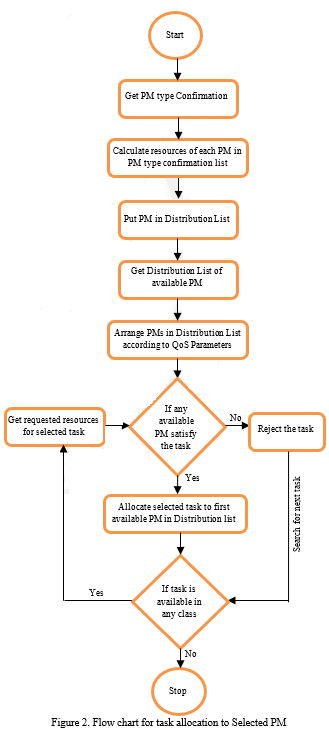EETSQ: Energy Efficient Task Scheduling based on QoS Parameters in Cloud Computing Environment
Main Article Content
Abstract
Now a day, energy consumption is the big challenge in heterogeneous cloud computing environment that needs to be considered. Cloud service provider also needs to satisfy customer’s Quality of Service (QoS) for better utilization. An energy efficient task scheduling based on QoS parameter has been proposed to address above said challenge. Firsty, all the incoming tasks are categorized into four classes based on some special attributes and prioritize according to importance of the classes. Secondly, Physical Machines (PMs) type confirmation list is selected based on the number of resource blocks and then select one PM that has maximum QoS value. All the Virtual Machines (VMs) on selected PM are prioritized according to their weight. Experimental evaluation done on CloudSim shows the effectiveness and efficiency of proposed approach.
Article Details
References
Lopes RV, Menascé D. A taxonomy of job scheduling on distributed computing systems. IEEE Trans Parallel Distrib Syst, vol. 27, no. 12, pp. 3412–3428, 2016.
Delimitrou C, Sanchez D, Kozyrakis C. Tarcil: Reconciling scheduling speed and quality in large shared clusters. In: Proceedings of the Sixth ACM Symposium on Cloud Computing SoCC ’15. New York: ACM; pp. 97–110, 2015.
Dubey S, Agrawal S. Qos driven task scheduling in cloud computing. Int. J. Comput. Appl. Technol. Res. vol. 2, no. 5, pp. 595–600, 2013.
G. Rajasekaran, & P. Shanmugapriya. (2023). Hybrid Deep Learning and Optimization Algorithm for Breast Cancer Prediction Using Data Mining. International Journal of Intelligent Systems and Applications in Engineering, 11(1s), 14–22. Retrieved from https://ijisae.org/index.php/IJISAE/article/view/2472
Potluri S, Rao KS. Simulation of QoS-Based Task Scheduling Policy for Dependent and Independent Tasks in a Cloud Environment. Smart Intelligent Computing and Applications; pp. 515–525, 2019.
Al-Ansi, A. M. . (2021). Applying Information Technology-Based Knowledge Management (KM) Simulation in the Airline Industry . International Journal of New Practices in Management and Engineering, 10(02), 05–09. https://doi.org/10.17762/ijnpme.v10i02.131
Delimitrou C, Kozyrakis C. Paragon: Qos-aware scheduling for heterogeneous datacenters. SIGPLAN Not; vol. 48 no.4, pp. 77–88, 2013.
Ousterhout K, Wendell P, Zaharia M, Stoica I. Sparrow: Distributed, low latency scheduling. In: Proceedings of the Twenty-Fourth ACM Symposium on Operating Systems Principles SOSP ’13. New York: ACM; pp. 69–84, 2014.
Sanna Mehraj Ka, Parul Agarwal, and M. Afshar Alam, “Task Scheduling Techniques for Energy Efficiency in the Cloud,” EAI Endorsed Transactions on Energy Web, Vol 9,No. 39, 2022.
Linz Tom and Bindu V.R; “DYNAMIC TASK SCHEDULING BASED ON BURST TIME REQUIREMENT FOR CLOUD ENVIRONMENT,” IJCNC, Vol 13, No 5, 2021.
Goiri I, Julia F, Nou R, Berral JL, Guitart J, Torres J. Energy-aware scheduling in virtualized datacenters. In: Proceedings of the 2010 IEEE International Conference on Cluster Computing CLUSTER ’10. Washington: IEEE Computer Society; pp. 58–67, 2012.
Hao, L., Cui, G., Qu, M., Ke, W.: Resource scheduling optimization algorithm of energy consumption for cloud computing based on task tolerance. J. Softw., vol. 9, no. 4, pp. 895–901, 2014.
Sofia Martinez, Machine Learning-based Fraud Detection in Financial Transactions , Machine Learning Applications Conference Proceedings, Vol 1 2021.
Song, J., Li, T., Wang, Z., Zhu, Z.: Study on energy-consumption regularities of cloud computing systems by a novel evaluation model, vol. 95 no. 4, pp. 269–287, 2013.
Shamita Phutane, Ankith Poojari, Saurabh Nyati and Bhavna Arora: Energy-Efficient Task Scheduling in Cloud Environment, International Research Journal of Engineering and Technology (IRJET), Vol: 09 No: 04 , pp. 2679-2684, Apr 2022.
Tang, Z., Qi, L., Cheng, Z., Li, K., Khan, S.U., Li, K.: An energy-efficient task scheduling algorithm in DVFS-enabled cloud environment. J. Grid Comput., vol. 14, no. 1, pp. 55–74, 2016.
Malik, N.; Sardaraz, M.; Tahir, M.; Shah, B.; Ali, G.; Moreira, F. Energy-Efficient Load Balancing Algorithm for Workflow Scheduling in Cloud Data Centers Using Queuing and Threshold, Appl. Sci. vol. 11, 2021.
Robert Roberts, Daniel Taylor, Juan Herrera, Juan Castro, Mette Christensen. Integrating Virtual Reality and Machine Learning in Education. Kuwait Journal of Machine Learning, 2(1). Retrieved from http://kuwaitjournals.com/index.php/kjml/article/view/175
Paya, A., Marinescu, D.: Energy-aware load balancing and application scaling for the cloud ecosystem. IEEE Trans. Cloud Comput., vol. 5, no. 1, pp. 15–27, 2017.
Sanjeevi, P., Viswanathan, P.: Towards energy-aware job consolidation scheduling in cloud. In: International Conference on Inventive Computation Technologies. IEEE 2017.
Arroba, P., Risco-Martín, J.L., Zapater, M., Moya, J.M., Ayala, J.L., Olcoz, K.: Server power modeling for run-time energy optimization of cloud computing facilities. Energy Procedia 62, pp. 401–410, 2014.
Mondal, D., & Patil, S. S. (2022). EEG Signal Classification with Machine Learning model using PCA feature selection with Modified Hilbert transformation for Brain-Computer Interface Application. Machine Learning Applications in Engineering Education and Management, 2(1), 11–19. Retrieved from http://yashikajournals.com/index.php/mlaeem/article/view/20
Banerjee, S., Adhikari, M.: Development and analysis of a new cloudlet allocation strategy for QoS improvement in cloud. Arab. J. Sci. Eng., vol. 40, no. 5, pp. 1409–1425, 2015.
Garg N, Goraya MS. Task deadline-aware energy-efficient scheduling model for a virtualized cloud. Arabian Journal for Science and Engineering.; vol. 43, no. 2, pp. 829-841, 1 Feb, 2018.
Dhiman, O. ., & Sharma, D. A. . (2020). Detection of Gliomas in Spinal Cord Using U-Net++ Segmentation with Xg Boost Classification. Research Journal of Computer Systems and Engineering, 1(1), 17–22. Retrieved from https://technicaljournals.org/RJCSE/index.php/journal/article/view/20
Anastasi, G.F., Carlini, E., Coppola, M., Dazzi, P.: QBROKAGE: a genetic approach for QoS cloud brokering. In: IEEE, International Conference on Cloud Computing, pp. 304–311, 2020.

